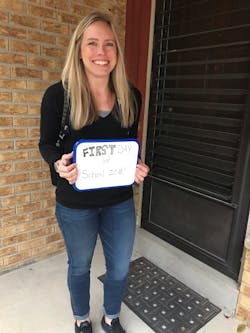As a professional journalist, over the years I have refined my approach and developed skills to report on specific industries. As someone who has a writing and publishing background, my job has always been to gain an understanding of the industry I serve and share that information with readers.
First, some background
Since I started my publishing career with this same company back in 2007 — the name has changed a few times, but the office has not — I have always reported on the transportation market. I began with a stint reporting on recreational vehicles (just in time for the ‘08 recession to hit). From there, I moved on to the automotive tool and equipment distribution world. I rose through the editorial ranks and branched into the commercial vehicle market in 2010 when I became managing editor of not just PTEN and Professional Distributor, but also Fleet Maintenance.
I took a break from Fleet Maintenance when I became the lead editor for PTEN and Professional Distributor in 2014. It wasn’t until developing content for a specific magazine that I understood the importance of taking a deep dive into an industry. Time and experience taught me to more thoroughly vet industry sources and how to parse out the necessary information readers need in order to make sound decisions for their own business.
When I stepped into the lead editorial role for Fleet Maintenance last year, this mindset of developing a thorough understanding of an industry did not change.
As a general rule, journalistic processes encourage you to utilize your resources to gain a full understanding of the subject on which you’re reporting. But resources can only get you so far. You also need to have background knowledge to provide a comprehensive understanding of the subject. This can be through passive research, attending industry events and by sheer volume and time spent reporting on the market. But, there is something to be said about gaining first-hand knowledge and experience on a subject through professional training.
With that, as I begin my second year as the lead editor for Fleet Maintenance, I’m establishing my commitment to the industry with continued education.
Continued education
So, how do I plan to further my education, to ensure I have a thorough understanding of our industry? The first step toward this commitment is to acquire a fundamental understanding of the vehicle, and the requirements of someone operating that vehicle. That starts with the truck itself.
With that, I am very excited to share with you that I am registered to attend the Waukesha County Technical College’s professional truck driving program. This 12-credit technical diploma program will provide intensive classroom, on-range and on-road training through a 10-week course at a local technical college.
Not only will I gain certification to legally inspect and drive a commercial vehicle over 26,000 pounds, I will get a first-hand look inside the educational structure for new recruits coming into our industry.
The course itself is designed to provide a comprehensive understanding of how a truck operates, the details on the functionality and operation of different systems of the truck, requirements and process for conducting pre-trip inspections, an overview of the hours of service requirements, trip planning and hands-on learning for how to operate a Class 8 tractor-trailer. At the end of the course, I will have the opportunity to complete (and presumably, pass) the skills tests for vehicle inspection, basic control skills and on-road driving test to receive a state-issued Class A Commercial Driver’s License.
My goal is to gain a more thorough understanding of the commercial vehicles you and your techs see in the shop on a regular basis. I want to know and understand this process first-hand, for perspective on the requirements of this segment of the industry. After all, drivers are the first line of defense when it comes to maintenance and service.
Trade publication editors are typically cut from two different cloths: a professional writing and publishing background, with an understanding of how to learn about an industry; or as members of a trade profession who learn how to write about it. Having an editor with both writing and industry experience is the best of both worlds. You always start with one, and learn from there. (Unabashedly biased) I personally believe having the publishing background is critical to establish a content-driven career in trade publishing. But to truly advance and excel in that world, it is critical to further education to establish and maintain industry credibility.
About the Author
Erica Schueller
Media Relations Manager | Navistar
Erica Schueller is the Media Relations Manager for Navistar.
Before joining Navistar, Schueller served as Editorial Director of the Endeavor Commercial Vehicle Group. The commercial vehicle group includes the following brands: American Trucker, Bulk Transporter, Fleet Maintenance, FleetOwner, Refrigerated Transporter, and Trailer/Body Builders brands.
An award-winning journalist, Schueller has reported and written about the vehicle maintenance and repair industry her entire career. She has received accolades for her reporting and editing in the commercial and automotive vehicle fields by the Truck Writers of North America (TWNA), the International Automotive Media Competition (IAMC), the Folio: Eddie & Ozzie Awards and the American Society of Business Publication Editors (ASBPE) Azbee Awards.
Schueller has received recognition among her publishing industry peers as a recipient of the 2014 Folio Top Women in Media Rising Stars award, acknowledging her accomplishments of digital content management and assistance with improving the print and digital products in the Vehicle Repair Group. She was also named one Women in Trucking’s 2018 Top Women in Transportation to Watch.
She is an active member of a number of industry groups, including the American Trucking Associations' (ATA) Technology & Maintenance Council (TMC), the Auto Care Association's Young Auto Care Networking Group, GenNext, and Women in Trucking.
In December 2018, Schueller graduated at the top of her class from the Waukesha County Technical College's 10-week professional truck driving program, earning her Class A commercial driver's license (CDL).
She has worked in the vehicle repair and maintenance industry since 2008.

